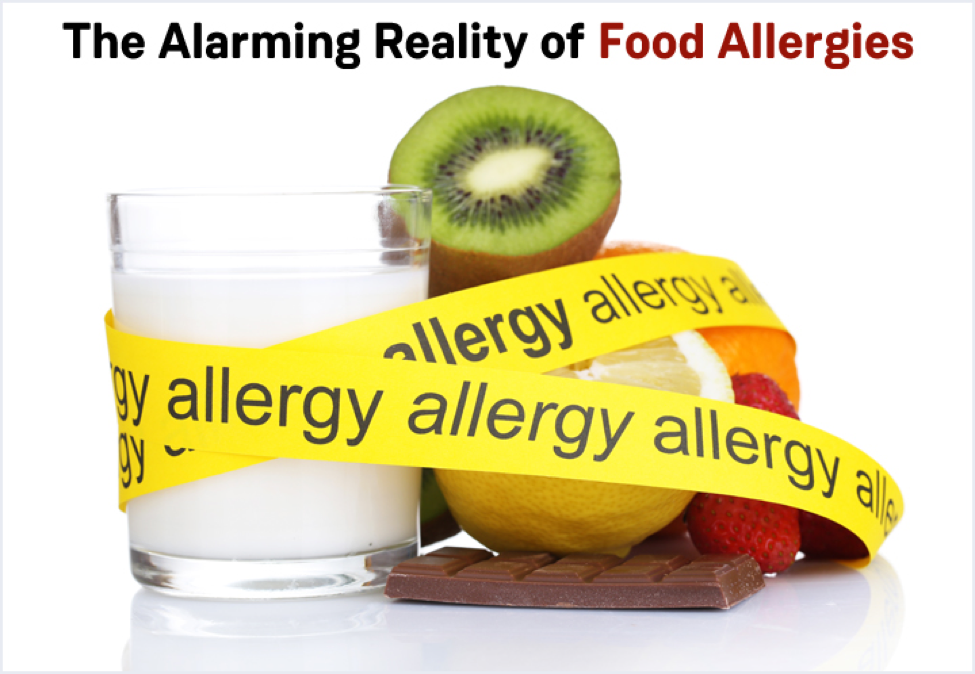The increase of food-related allergies in the world is alarming. For food companies and those who handle or store food at some point along the supply chain, compliance is mandatory and crucial. Understanding how to implement, enforce, and automate management is a major key to being successful.
The Alarming Reality of Food Allergies
For people without food allergies, it’s relatively easy to write this issue off as a small problem that can be dealt with simply by abstaining from trigger foods. Unfortunately, this is an uneducated look at an increasingly serious public health issue in this country.
Here are some facts and statistics on the state of food allergies, as curated by Food Allergy Research and Education (FARE):
- As many as 15 million Americans have food allergies, and a food allergy reaction sends someone to the emergency room every three minutes. This means that there are more than 200,000 visits every year.
- Food allergies among children have increased more than 50 percent since 1997. As a result, it now affects 1 in every 13 children under the age of 18.
- Eight foods account for 90 percent of all reactions: milk, peanuts, eggs, soy, tree nuts, wheat, fish, and shellfish.
- There’s no known cure for food allergies. The only solution is strict avoidance and early recognition of symptoms.
As you can see, food allergies are a big problem. And, while it’s a health issue from the consumer perspective, food allergies are a legal, fiscal, and ethical issue when it comes to businesses that produce, store, or distribute food.
Three Tips for Allergy Compliance
While every organization is subjected to different demands based on processes and function, the following tips are universally applicable when it comes to food allergies and the responsibility of businesses to look out for the needs of customers.
1. Focus on the Big Eight
As mentioned, milk, peanuts, eggs, soy, tree nuts, wheat, fish, and shellfish account for 9 out of every 10 food-based allergic reactions each year. If you’re able to eliminate the risk associated with these foods, you can greatly diminish your chances of getting caught up in related problems.
Regardless of whether or not you store any of these eight foods, you need to have a strict policy regarding food contamination in warehouses, cooking areas, and serving areas. Even the slightest contamination can result in serious problems.
2. Eliminate Cross Contact
Most organizations are aware of the big eight, yet few do enough to mitigate the risk of cross contact between food products and these allergens. Since cross contact can occur at any stage of the supply chain, it’s critical that you understand all of the different ways that it can take place. Here are just a few of the possible culprits:
- Direct cross contact of ingredients before or after receiving
- Cross contact by an allergen from a totally different product
- Accidental mishaps in the recipe or production of a product
- Airborne dust
- Re-use of materials, supplies, or surfaces in an improper manner
- Incorrect or incomplete product packaging
- Inadequate storage and/or raw material handling
- Human errors
As a warehouse manager, many of these issues and risks are totally out of your control. However, understanding the various risks of cross contamination at each level of the supply chain can help you to gain a better understanding of the overall process and where your warehouse fits into the equation.
3. Make Employee Training a Priority
The only way to ensure top-down compliance and better food safety processes is to make employee training an organizational priority.
“All involved in the commercialization , production and distribution of foods should understand the implications of the presence of food allergens and the need to manage the ensuing risk,” FoodDrinkEurope explains. “Thus, individuals (e.g. top management, marketing, internal auditors, product developers, design engineers, plant personnel and contractors, employees handling consumer complaints) should receive training specific to their job responsibilities in this area.”
Training should happen as soon as employees are hired, but there also needs to be a continuing education program to ensure that long-time employees aren’t losing sight of the importance of food safety.
Ready for a specialized food ERP? Learn more about Aptean Food & Beverage ERP JustFood Edition — a solution purpose-built to solve your challenges and propel your food business and digital transformation to the next level.
